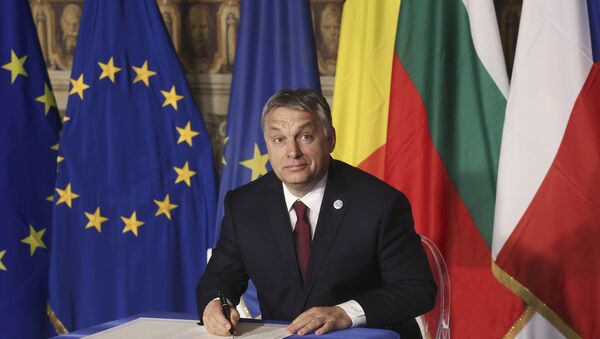1. Migration
Viktor Orban has been pursuing a tough stance toward migrants since the refugee crisis broke out in Europe in 2015. After hundreds of thousands of migrants entered Hungary, Budapest built a border fence along its southern frontier to stop the inflow.
The politician repeatedly noted that "it is very important to preserve our ethnic homogeneity." This motto has become a key issue on his political agenda ahead of the election and is unlikely to change in the near future.
In a recent interview with the Hungarian newspaper Magyar Idők, the politician said that if the opposition is victorious in the election, they would accept Brussels' refugee quota regulations and thus make the process of immigration "unstoppable" and "irreversible."
READ MORE: Hungarian Vote Outcome Uncertain Despite Fidesz Party's Likely Win — EU Lawmaker
Orban described migration as the number one problem and argued that such a turn of events must be prevented.
"We have something to lose, and this is why we must defend the borders and not let migrants in. If we recklessly allow others to decide our fate, they will destroy everything. Migration is the rust which would slowly but surely consume our country," the politician said.
Most recently, Viktor Orban has voiced solidarity with Poland on the migrant issue amid a row with Brussels.
"We believe Poles and Hungarians have a common path, common fight and common goal: to build and defend our homeland in the form that we like it… Christian and with national values," Orban said, adding that Warsaw can count on Budapest in its row with EU authorities.
2. Social Benefits and Unemployment
One of the main topics on Orban's political agenda is social issues, such as unemployment, pensions and family support.
In an interview with Magyar Idők, the politician stressed that over the last few years the unemployment rate in Hungary has decreased to below 4 per cent. The politician also noted that the country is moving toward a work-based economy and higher pensions and stressed that the he and his party would continue to work in this direction.
"In Hungary we shall attain full employment: everyone who wants to work will have a job. We shall support families and mothers raising children at an increased rate, year on year. […] The reduction in household utility bills will remain in place, and when the economy does well, we shall also always give a share of its proceeds to the elderly — because they deserve respect," Orban said.
3. Relations with Brussels
Orban presents his Fidesz party as a force capable of resisting the pressure from Brussels, according to the website of the Hungarian government.
Although a member of the EU, the politician promotes the idea of a strong and independent Hungary.
He also warns that if the opposition wins the election, the new government will play into Brussels' hands, ignoring Hungary's national interests.
READ MORE: UNHRC Has Sided With George Soros Against Hungarian People — Foreign Minister
Recently, Orban's government also opposed the decision of over 25 EU countries to expel Russian diplomats over the Skripal case. The Hungarian authorities noted that the step was made prematurely, since no results of the investigation have yet been presented.
Viktor Orban has also been critical of Western sanctions against Russia introduced since 2014, following the Ukrainian crisis, viewing the restrictive measures as counterproductive.
4. Taxes
The politician supports proportional taxation. Such a system is currently active in Hungary and, according to Orban, should remain in place.
Orban believes that an individual who earns ten times more than another one should pay accordingly more in taxes.
5. Economic Competitiveness
One of the main goals on Orban's political agenda is to increase Hungary's economic competitiveness.
"I'm thinking in terms of a Hungarian model," he said, "based on competitiveness, full employment, demographic policy and identity policy."
Various projects worked out by groups of economic experts are currently being analyzed. In January 2019, according to Orban's plans, the country should launch a decisive policy of competitiveness to improve the country's future economic prospects.




